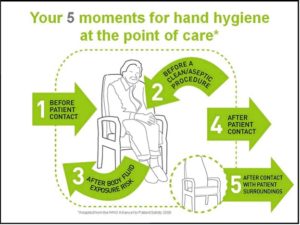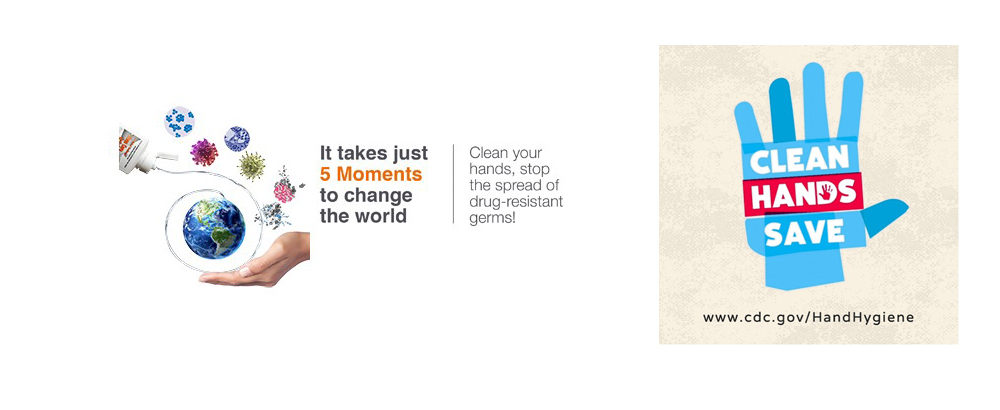Did you know May 5th is World Hand Hygiene Day? The CDC and WHO know it’s important. 2017 marks a global call to action to fight antibiotic resistance and spread of disease. We at KP also want to emphasize that clean hands count. This week we have been promoting adherence to the CDC and WHO guidelines and addressing misconceptions about hand hygiene in a fun and informative way.
Health care workers can play a vital role to protect patients from infections that are difficult to treat by performing hand hygiene at 5 key moments, preferably by using an alcohol-based rub or by hand washing with soap and water if hands are visibly dirty.
 The ‘5 Moments’ for Hand Hygiene are:
The ‘5 Moments’ for Hand Hygiene are:
- Before touching a patient.
- Before clean and aseptic procedures (e.g. inserting devices such as catheters).
- After contact with body fluids.
- After touching a patient.
- After touching patient surroundings.
Give us a hand: Point out where you think a hand sanitizer station should be in your work area.
- Studies show that some health care providers practice hand hygiene less than half of the times they should.
- Health care providers might need to clean their hands as many as 100 times per 12-hour shift, depending on the number of patients and intensity of care.
- Know what it could take to keep your patients safe.
Germs are everywhere!
- Your hands have good germs on them that your body needs to stay healthy.
- Your hands can also have bad germs on them that can spread illness
- These germs live on the surface and are easily killed/wiped away by the alcohol-based hand sanitizer.
- Using an alcohol-based hand sanitizer is the preferred way to keep your hands clean over soap. Why?
An alcohol-based hand sanitizer is the preferred method for cleaning your hands when they are not visibly dirty because it:
- Is more effective at killing potentially deadly germs on hands than soap
- Requires less time
- Is more accessible than a sink
- Produces reduced bacterial counts on hands
- Improves skin condition with less irritation and dryness than soap and water
Soap for 15 seconds and then rinse with water….
- If you use soap: Soap your hands for at least 15 seconds
- The time it takes is less important than making sure you clean all areas of your hands.
Remember to turn off the faucets with a disposable towel so you don’t recontaminate your hands.
Soap and water for C. difficile
- Clostridium difficile is a common organism that causes severe diarrhea.
- C. difficile forms spores that are not killed by an alcohol-based hand sanitizer.
- The spores can be transferred to patients via the hands of healthcare providers who have touched a contaminated surface or item.
- The most important way that you can prevent the spread of C. difficile is by washing your hands with soap and water after touching potentially contaminated surfaces.
What about antibiotic resistance?
- The antimicrobial activity of alcohols can be attributed to their ability to denature proteins.
- Alcohol-based hand sanitizers containing at least 60%-95% alcohol are most effective at denaturing proteins.
- There is no chance for the germs to adapt or develop resistance.
Check out a few fun, informative videos below to learn more:
WHO: Save Lives–Clean Your Hands
KPMAS thanks you for taking a moment to make hand hygiene a priority. Ten people who answer the quiz below correctly will win a $25 Starbucks gift card!
Take the quiz here.




